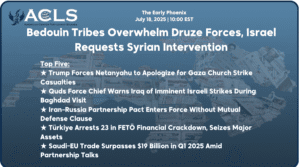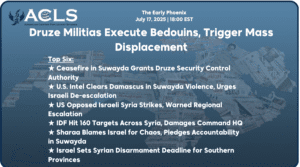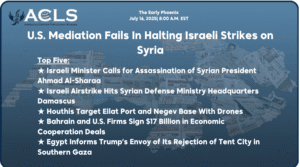Top 5 Headlines:
- Jerusalem Shooting: Three Israelis Dead.
- Iran Declares After Al-Aqsa Uprising.
- Israeli Shipping Company Reroutes from Suez Canal.
- Guarantor Offer in Gaza, Turkey-Qatar Coordination.
- UK Sends Warship to Gulf, US Warns of Iran’s “Unsafe” Behavior.
ISRAEL & PALESTINIAN TERRITORIES
- Gaza Ceasefire Prolonged as Israel-Hamas Negotiate Prisoner Swap. Israel and Hamas have agreed to a one-day extension of their temporary truce in Gaza, maintaining the terms of the previous ceasefire. Under these terms, Hamas will release 10 Israeli citizens for 30 Palestinians held in Israeli jails. The extension, mediated by Qatar, Egypt, and the United States, follows a series of hostile events in the region, including a US Navy warship downing an Iranian drone in the Red Sea and continued violence in the West Bank. Despite the truce, disagreements persist over the “prisoners file,” with Hamas rejecting the inclusion of certain prisoners in the current deal. The US has called for a reduced combat zone in southern Gaza to prevent civilian casualties. Secretary of State Antony Blinken’s visit to the region aims to extend the truce and increase humanitarian aid to Gaza.
- Jerusalem Shooting: Three Israelis Dead, Six Wounded in Ramot Settlement Attack. In an attack at the entrance to Jerusalem, three Israelis were killed and six others injured, some critically, following an explosion and shooting at two locations in the Ramot settlement. The Israeli Ambulance Authority identified the deceased as two women, aged 24 and 60, and an elderly man aged 70. Israeli police reported that two gunmen, identified as brothers from the town of Sur Baher in Jerusalem, were “neutralized.” The police found bullet magazines with hundreds of bullets in the gunmen’s car. Additionally, three Palestinians were killed at the Ramot attack site by police and a settler. Reinforcements were sent to the area to search for other possible gunmen, and a large number of ambulances and police personnel gathered at the scene. The police confirmed that the suspects were immediately neutralized after they arrived in a car and opened fire on civilians at a bus stop.
- Israel Considers Replicating “Beirut Model” in Gaza. Israel contemplates strategies, including forcibly removing low-level Hamas fighters, to prevent a repeat of the October 7 attack in Gaza. Discussions with the U.S. revolve around post-Hamas governance, proposing the creation of “safe zones free from Hamas.” Challenges persist in reaching consensus on key issues to end the war and determine Gaza’s future administration and security.
- Israeli President to Discuss “Hostage Issue” on the Sidelines of COP28 Conference in Dubai. Israeli President Isaac Herzog participates in the UN Climate Conference “COP28” in the UAE, engaging in talks about releasing hostages held by Hamas in Gaza. Herzog aims to involve world leaders in high-level humanitarian efforts during COP28. The visit follows weeks of war with Hamas and aligns with an extended ceasefire, fostering negotiations for further hostage releases.
======================
IRAN
- Escalation in Attacks on US Troops by Iranian Proxies. Following a brief ceasefire between Israel and Hamas, Iranian proxies resumed attacks on US forces in the Middle East. Incidents include targeting troops in Syria and a US destroyer intercepting an Iranian-made drone near the Bab el-Mandeb Strait. Critics argue that Biden’s Iran policy has emboldened these proxy forces, while the administration maintains its right to defend American troops. Iranian officials deny direct involvement, despite evidence of support for groups like Hamas and Hezbollah.
- Israeli Spies Exposed After Al-Aqsa Operation, Says Islamic Jihad. Islamic Jihad claims that spies working for Israel, even within Iran, were identified after the Al-Aqsa Storm operation in October. The resistance forces reportedly accessed Israeli data servers during the operation, revealing the names of numerous spies, leading to heightened tensions in the region.
- Iran Declares US-Proposed Trade Route to India Null After Al-Aqsa Uprising. Iranian Assistant Army Commander Admiral Habibollah Sayyari announces the complete cancellation of the trade route proposed by the US to India, passing through Saudi Arabia and reaching the port of Tel Aviv. Sayyari emphasizes the impact of the Al-Aqsa Uprising on altering regional dynamics, leading to the withdrawal of Zionist forces from the South Caucasus during the Gaza conflict. The operation’s achievements include garnering global support for Palestine and challenging the Zionist regime’s dominance, reviving the Palestinian cause on the world stage.
- UK Sends Warship to Gulf, US Warns of Iran’s “Unsafe” Behavior. The UK dispatches the HMS Diamond to the Gulf amid rising tensions. The move follows an Iranian drone’s approach to the USS Eisenhower. The UK aims to deter malign actions, ensuring maritime security and trade flow. The US warns of Iran’s unsafe conduct, emphasizing the need to address threats.
======================
IRAQ
- Chinese Company Plans Iron Production City in Iraq. China’s Shang Xin intends to establish an iron production city in Basra, Iraq, as part of the country’s initiative to attract foreign investments in natural resources. Iraqi Prime Minister Mohammad Shiaa Al-Sudani welcomed Shang Xin’s president, Zhang Jieming, expressing Iraq’s promising investment opportunities and commitment to facilitating major international companies of various nationalities. The project aligns with Iraq’s strategy to invest in natural resources, fostering economic reforms and industrial development.
======================
THE GULF REGION & YEMEN
- Israeli Shipping Company Reroutes from Suez Canal. The Israeli shipping company Zim has decided to reroute its vessels away from the Suez Canal due to heightened tensions in the Arabian Sea and the Red Sea. This move follows recent incidents, including the attack on an Israeli-owned container ship in the Indian Ocean and the detention of the “Galaxy Leader” by the Yemeni Houthi group. The Houthis have repeatedly threatened to target ships linked to Israeli companies, raising security and cost concerns for maritime trade. The diversion of ships from the Suez Canal, a crucial route overseeing 10% of global maritime trade, signifies increased operational costs and possible delays for Israeli and international shipping companies.
- Saudi Arabia’s Global Oil and Gas Investment Exposed. The Guardian’s investigation reveals Saudi Arabia’s extensive plan to boost global demand for oil and gas, particularly in developing countries. Critics argue this strategy aims to create dependency on harmful fossil fuels. Despite limited public information, the plan reportedly includes increasing fossil fuel-powered transportation in Africa and promoting high fuel-consuming supersonic air travel. This strategy aligns with Saudi Arabia’s economic interests but contrasts with global climate commitments and renewable energy potential in regions like Africa.
======================
EGYPT & NORTH AFRICA
- Egypt’s Role in Israeli-Palestinian Conflict Resolution and Gaza Aid. Egypt is actively engaging in the Israeli-Palestinian conflict resolution by emphasizing the need for a two-state solution and urging international cooperation to implement this approach effectively. Egyptian Foreign Minister Sameh Shoukry calls for addressing the root causes of the conflict and rejects any ideas of reoccupying Gaza, instead focusing on ending the blockade and ensuring proper governance. Concurrently, Egypt is facilitating the Palestinian-Israeli prisoner exchange, with preparations underway for the seventh release of Israeli detainees. This effort is part of the broader humanitarian ceasefire in Gaza, during which Egypt is also playing a pivotal role in delivering essential humanitarian aid, including food, medicine, and fuel, through the Rafah border crossing. These actions highlight Egypt’s commitment to not only immediate relief but also to the long-term resolution of the conflict.
- Egypt’s Border Trade and Suez Canal Revenue Surge. Egypt’s border economic activity is on the rise, with talks underway to establish a free trade zone near the Saloum-Libya crossing, despite financial and political challenges. Simultaneously, the Suez Canal records a historic revenue high in November, reaching $854.7 million, a 20.3% increase from the previous year, and anticipates an annual revenue of $8.8 billion in 2023, reflecting the canal’s growing significance in global trade.
======================
SYRIA
- Iranian Militia Buildup in Syria and First Missile Attack on US Forces Post-Gaza Truce. Iranian militias, notably Hezbollah, have intensified their presence in central Syria, deploying to an air defense battalion in the northern countryside of Homs. This strategic move involves the transfer of significant military reinforcements and weapons. Concurrently, U.S. forces stationed on the Euphrates River in Syria were targeted by a missile attack, marking the first such incident since the Gaza truce. This attack, which fortunately resulted in no casualties or infrastructure damage, adds to the 74 attacks U.S. forces have faced since mid-October.
======================
TURKIYE
- Guarantor Offer in Gaza, Turkey-Qatar Coordination. Turkey’s Foreign Minister Hakan Fidan proposed a guarantor mechanism to maintain the Gaza ceasefire at the U.N. and advocated for a peaceful coexistence between Israel and Palestine. Meanwhile, Turkish Defense Minister Hulusi Akar’s meeting with Qatar‘s Defense Minister Khalid bin Mohammed Al-Attiyah in Ankara, amidst heightened tensions between the U.SIsrael, and Turkey, is believed to discuss the situation in Gaza, reflecting Turkey’s active role in regional diplomacy.
- Turkey’s Economy Expands 5.9% in Q3, Boosted by New Oil Discoveries. Turkey’s GDP grew by 5.9% in the third quarter of 2023, marking the 13th consecutive quarter of growth since 2020. This robust expansion was driven by notable increases in various sectors, including construction, industry, and finance. Additionally, the discovery and operation of new oil wells in the Şırnak region, particularly in the Şehit Esma Çevik Oil Field on Gabar Mountain, has significantly contributed to this economic surge. With the current production of 27,000 barrels of oil per day, and the goal to reach 35,000 barrels by year-end, Turkey is on track to significantly boost its economic output and energy independence.
======================
📢 In case you missed it,
📰 Israel
📰 IRAN
📰 SYRIA
📰 TURKIYE
Follow the latest news from the American Center for Levant Studies via Google News



